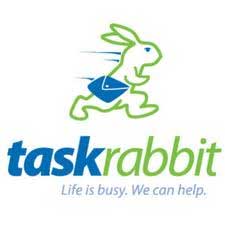AirBnB, Froomz, Getaround, Vayable, and TaskRabbit are part of the growing “Collaborative Consumption” economy in California. It is an economy driven by the internet, technology and the entrepreneurship of young Californians. For California’s workforce community, it is creating new markets and new forms of employment.
AirBnB allows individuals to rent apartments and houses/rooms in houses to travelers, as alternative to hotels or other lodgings. Such rentals have been done on an informal, haphazard scale for many years; they have been undertaken on a small scale by general websites, such as craigslist. AirBnB routinizes the process and exponentially expands it.
AirBnB introduces approaches to insurance and security, and a technology solution that enables providers to link to national and worldwide markets of travelers. Similarly Froomz enables individuals or companies to meet online and enter into agreements for event and meeting space rentals.
 AirBnB and Froomz generate jobs directly in their operations. On a recent day, the AirBnB website had openings for 8 software engineering positions in San Francisco—examples, Engineer Backend, Engineer Frontend , Engineer iOS , Engineer Mobile, Engineer Site Reliability. It also had listings for 20 other jobs in Financing/Accounting, Analytics, Customer Service, and Graphic Design, exemplifying the non-engineering jobs being generated by these firms. Froomz more generally requests engineers with web 2.0 or mobility expertise and “hands-on biz dev” people.
AirBnB and Froomz generate jobs directly in their operations. On a recent day, the AirBnB website had openings for 8 software engineering positions in San Francisco—examples, Engineer Backend, Engineer Frontend , Engineer iOS , Engineer Mobile, Engineer Site Reliability. It also had listings for 20 other jobs in Financing/Accounting, Analytics, Customer Service, and Graphic Design, exemplifying the non-engineering jobs being generated by these firms. Froomz more generally requests engineers with web 2.0 or mobility expertise and “hands-on biz dev” people.
Beyond the jobs directly created at the companies, though, are the forms of income generation or employment created outside of the companies. AirBnb, Froomz and other companies such as Getaround (which enables individuals to rent out their autos) are creatively making use of underutilized resources. Renting rooms, event venues, or cars enables individuals to generate value and income, and is a form of employment as much as a payroll job.
 The new forms of self-employment are even clearer in another part of California’s Collaborative Consumption economy. Vayable and Task Rabbit are firms enabling persons to utilize skills and expertise into forms of self-employment. Vayable describes itself as “the best way to find unique, insider travel experiences, worldwide”. It enables individuals to monetize their expertise as “guides”, for, say, a tour of the best Chinese retail stores in San Francisco’s Chinatown, or a private sail on Monterey Bay, or touring public art in the Mission District.
The new forms of self-employment are even clearer in another part of California’s Collaborative Consumption economy. Vayable and Task Rabbit are firms enabling persons to utilize skills and expertise into forms of self-employment. Vayable describes itself as “the best way to find unique, insider travel experiences, worldwide”. It enables individuals to monetize their expertise as “guides”, for, say, a tour of the best Chinese retail stores in San Francisco’s Chinatown, or a private sail on Monterey Bay, or touring public art in the Mission District.
TaskRabbit (“get just about anything done by safe, reliable, awesome people”) is a marketplace for individuals to create or expand self-employment in delivery, house chores, and shopping and handyman tasks.
Of the tens of “Collaborative Consumption” firms now underway, a good number will not be around three years from now. Yet, even those that do not survive will be contributing to the evolving markets for new part-time and full-time employment. Further, the leaders of these companies are in their mid to late twenties. Most will move on to a series of other entrepreneurial ventures, building on their experiences in the “Collaborative Consumption” economy.
 Mr. Jeremy Wallenberg is director of external affairs at sf.citi (San Francisco Citizens Initiative for Technology and Innovation), the association of San Francisco technology firms, involved in workforce preparation and civic connections. Mr. Wallenberg notes that the rapid growth of the Collaborative Consumption economy has given rise to a series of tax and revenue questions (i.e. should renting rooms through AirBnB be subject to the city’s hotel tax), bringing the City government more closely into this economy (Mayor Lee has formed a “Sharing Economy Working Group”).
Mr. Jeremy Wallenberg is director of external affairs at sf.citi (San Francisco Citizens Initiative for Technology and Innovation), the association of San Francisco technology firms, involved in workforce preparation and civic connections. Mr. Wallenberg notes that the rapid growth of the Collaborative Consumption economy has given rise to a series of tax and revenue questions (i.e. should renting rooms through AirBnB be subject to the city’s hotel tax), bringing the City government more closely into this economy (Mayor Lee has formed a “Sharing Economy Working Group”).
Of course, the most striking feature of the Collaborative Consumption economy is how it is arising outside of government. This economy was not the result of planning by someone in city, state or federal government or government task force. It has arisen from the confluence of technology, entrepreneurship and globalization: the main forces that will continue to drive the job world.

